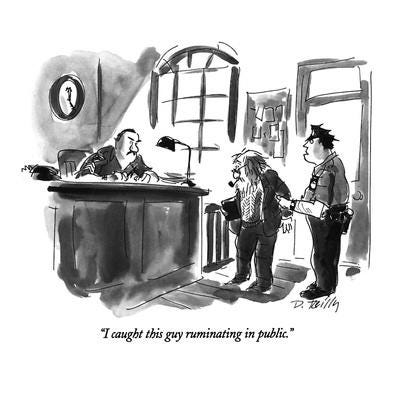The Fine Art of a Good Rumination
In this issue: The Fine Art of a Good Rumination/ The New Rules of Work Clothes/ How to make your workout as fun as a video game, according to behavioral scientists / The Lighter Side of Rumination
Why you’re getting this:
I'm Andrea J. Miller and this is my “On Leading Well” Newsletter. I send this to people in my networks, people I’ve met recently, and friends I want to keep in touch with. You can unsubscribe (SEE THE VERY BOTTOM OF THE EMAIL) anytime, I won’t be offended
The Fine Art of a Good Rumination
2.5 years of waiting…
wondering…
and worrying.
Finally, two weeks ago I got COVID (I’m fine-ish, thanks for asking :)
Though I’d let go of my hyper-vigilance after being vaccinated, I remained careful.
Which is why, once I took the tests (two to be sure) I couldn’t help but think that I wasted a lot of time ruminating over an event that turned out to be not that big of a deal (except for the fatigue, which was/is seriously brutal).
This isn’t terribly surprising, because I’m a ruminator, so much so I even ruminated over my ruminating :).
Of course, given all the unknowns of COVID, it’s important to take it seriously, but did I need to spend quite so much time thinking about it, probably not.
That said, you shouldn’t underestimate the value of a good rumination.
The Power of (Positive) Rumination
Rumination has gotten a seriously bad rap, mainly because of how we do it.
Rumination doesn’t have to be all negative…and when it is, it’s important to create boundaries.
Years ago, when I was recovering from my 3rd surgery in 5 years and was having what my British friends called a wobbly (they do have a way with words), I knew it was important to fully express those feelings.
It was a period of tremendous loss for me and pretending everything was okay wasn’t okay.
I also knew that it would be very easy to let all the negative thoughts take over, which wouldn’t have helped me or my recovery…so, I chose to impose time limits.
On the truly bad days, I would give myself 24 hours for what I called my personal pity party (quite exclusive, by invite only).
This allowed me the time I needed to process things, but not let it perpetually rent out space in my head, because frankly it was a pretty boring and not very useful party.
During that difficult time, I also took time to savor the good.
The support I had from family and friends during my recovery.
The opportunity to spend time with my parents before their passing.
It reminded me that though it was a rough few years it wasn’t all bad. Allowing myself to think about and ruminate over the good helped me to manage the bad.
The research verifies this finding. The good things in life can have a lot of positive effects, even when you’re feeling down.
In addition to boosting our moods and decreasing depression, ruminating on positive memories can also help us be more solutions-focused, which is incredibly helpful when we’re under stress. In COVID terms it’s almost like a vaccination against these difficult emotions.
A good rumination interrupts the stress response in your body.
In one experiment they found that if you stress people out, and then have them recall a positive memory it would reduce or eliminate the negative spike in cortisol typically associated with stressful events.
Researchers found that these positive ruminations had a dampening effect on cortisol and also boosted the brain’s mechanisms around planning and decision-making
Given all the positive effects of a good rumination, don’t you think it’s worth giving it a try?
Upping your Rumination Game ( For More Details See: The Science of Happiness Podcast)
1) Choose an activity that you like doing. It could be anything, reading, going for a hike in nature, a hobby, whatever it is that brings you joy.
2) Next, do an activity with someone else, something that you enjoy doing together.
3) Finally, do something that you consider personally meaningful, like volunteering for a cause that matters to you.
4) Then, block some time to write about them. Give each experience a title and describe the events in detail, how they made you feel in the moment, and how it makes you feel to be writing about it, and then, reflect back on it.
And if you aren’t able to do something at the moment, you can create and/or remember your own positive experiences.
What was the last nice thing you did for yourself?
What was the last positive thing you did with someone else?
What was the last thing you did that was personally important and meaningful you did for yourself?
Happy Ruminating!
—
The Lighter Side of Ruminating
—
RECOMMENDED LISTENS, READS And other interesting things
“After two years of hastily throwing a business jacket over a T-shirt and sweatpants while letting people into our homes during the Covid-19 pandemic, our tolerance for conformity — and discomfort — has changed. The business dress code is evolving… “
4 Ways to gamify your exercise routine, according to behavioral scientists
How to make your workout as fun as a video game, according to behavioral scientists
—
Are there any other subjects you want me to cover? Hit “Reply” and tell me!
I love hearing from you :)!
—
If you enjoyed this newsletter, please forward to a friend (or 5 :) or someone you feel would benefit from reading it!
Andrea J. Miller
+1 (646) 556-5401 (Whatsapp)
.



